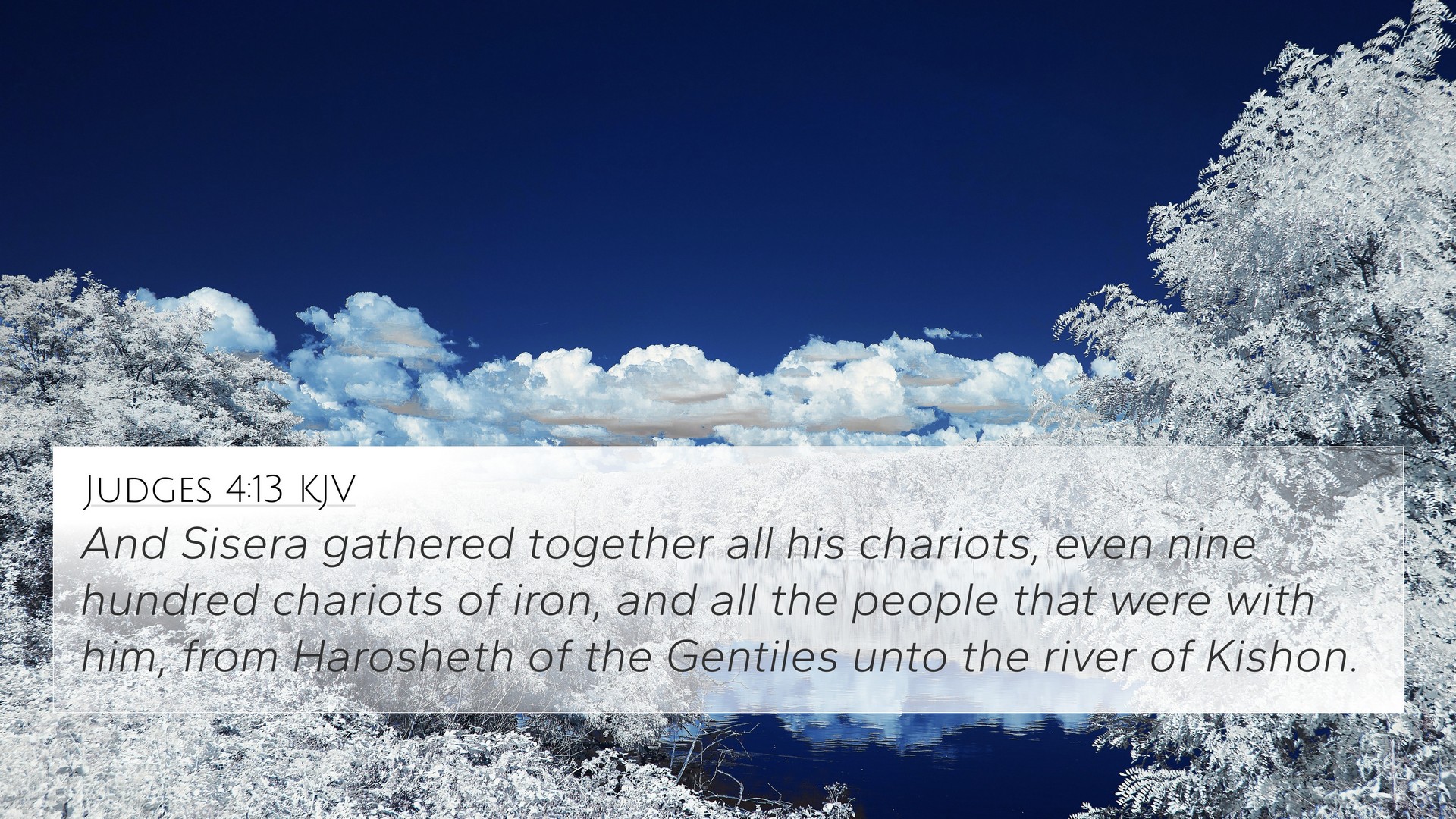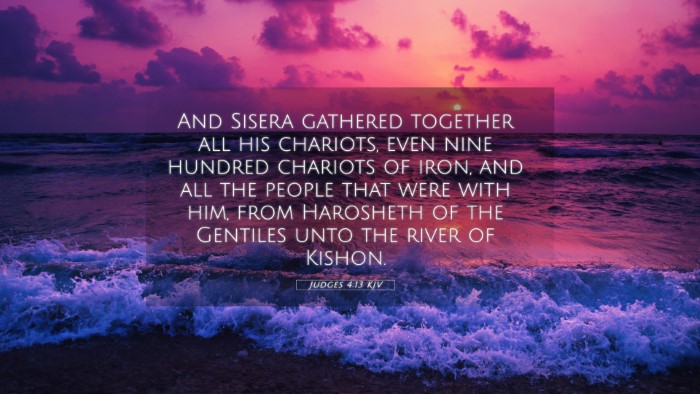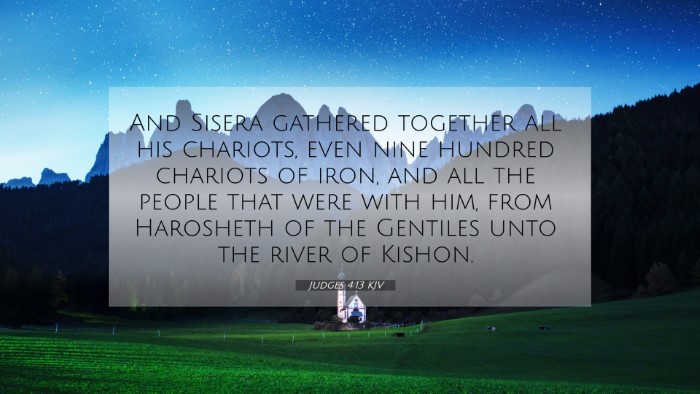Old Testament
Genesis Exodus Leviticus Numbers Deuteronomy Joshua Judges Ruth 1 Samuel 2 Samuel 1 Kings 2 Kings 1 Chronicles 2 Chronicles Ezra Nehemiah Esther Job Psalms Proverbs Ecclesiastes Song of Solomon Isaiah Jeremiah Lamentations Ezekiel Daniel Hosea Joel Amos Obadiah Jonah Micah Nahum Habakkuk Zephaniah Haggai Zechariah MalachiJudges 4:13 Similar Verses
Judges 4:13 Cross References
And Sisera gathered together all his chariots, even nine hundred chariots of iron, and all the people that were with him, from Harosheth of the Gentiles unto the river of Kishon.
Uncover the Rich Themes and Topics of This Bible Verse
Listed below are the Bible themes associated with Judges 4:13. We invite you to explore each theme to gain deeper insights into the Scriptures.
Judges 4:13 Cross Reference Verses
This section features a detailed cross-reference designed to enrich your understanding of the Scriptures. Below, you will find carefully selected verses that echo the themes and teachings related to Judges 4:13 KJV. Click on any image to explore detailed analyses of related Bible verses and uncover deeper theological insights.
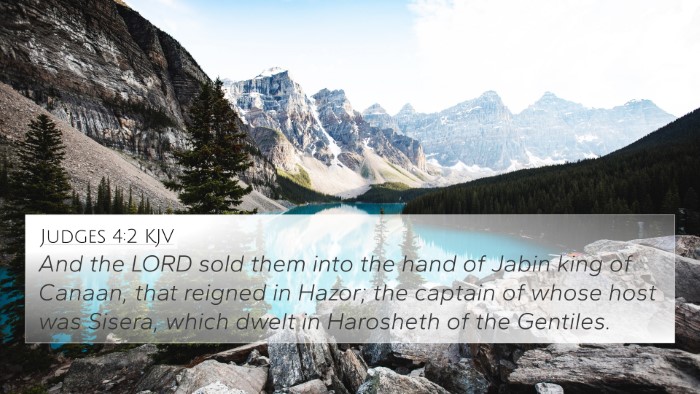
Judges 4:2 (KJV) »
And the LORD sold them into the hand of Jabin king of Canaan, that reigned in Hazor; the captain of whose host was Sisera, which dwelt in Harosheth of the Gentiles.
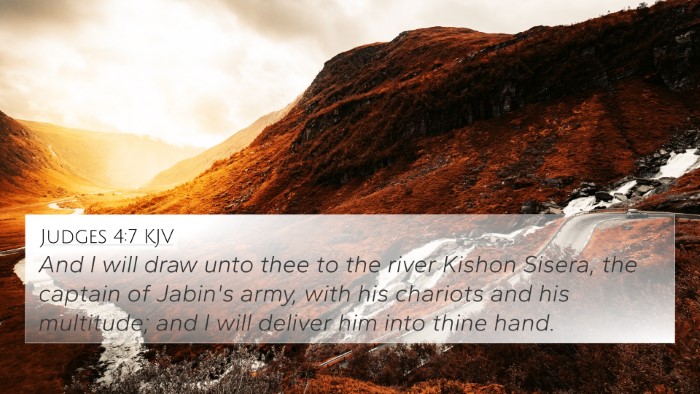
Judges 4:7 (KJV) »
And I will draw unto thee to the river Kishon Sisera, the captain of Jabin's army, with his chariots and his multitude; and I will deliver him into thine hand.
Judges 4:13 Verse Analysis and Similar Verses
Understanding Judges 4:13
Judges 4:13 states: "And Sisera gathered together all his chariots, even nine hundred chariots of iron, and all the people that were with him, from Harosheth of the Gentiles unto the river of Kishon." This verse sets the stage for God's deliverance of His people from oppression. Below is a comprehensive analysis, drawing from notable public domain commentaries.
Interpretation and Commentary
Matthew Henry's Commentary
Matthew Henry elaborates that Sisera, the captain of Jabin's army, assembled his forces in a display of military might, showcasing his confidence in the power of iron chariots. These were significant in ancient warfare, symbolizing strength and overwhelming force.
Albert Barnes' Notes on the Bible
According to Albert Barnes, the mention of "nine hundred chariots of iron" indicates the formidable nature of Sisera's army. This detail serves to highlight the seriousness of the conflict and the daunting situation that Israel faces, emphasizing the miraculous nature of the impending victory through divine intervention.
Adam Clarke's Commentary
Adam Clarke points out that Sisera's gathering of forces from Harosheth of the Gentiles to the river Kishon illustrates the extensive reach of his campaign. The river Kishon is noted for its historical significance and is pivotal in the defeat of Sisera, as chronicled in subsequent verses.
Bible Cross-References
Judges 4:13 connects with numerous other passages in the Bible that enhance understanding of this verse:
- Judges 5:19-21 - The song of Deborah recounts the battle and God's intervention.
- Exodus 14:7 - References Pharaoh's chariots on a similar theme of oppression.
- 1 Samuel 13:5 - Discusses the Philistines and their iron chariots.
- Psalm 68:17 - God’s chariots are described as thousands, signifying His power over earthly armies.
- 2 Chronicles 20:15 - The battle belongs to the Lord; He handles the adversaries.
- Hebrews 11:32-34 - Acknowledges the faith of those who conquered kingdoms, emphasizing divine aid.
- Isaiah 31:1 - Curses reliance on chariots instead of God, reflecting a thematic correlation.
Thematic Bible Verse Connections
The connection between Judges 4:13 and other verses centers around the themes of divine power versus human strength. The following themes emerge:
- God's Superiority: Despite Sisera's military might, the key message is God's ability to deliver His people against overwhelming odds.
- Faith in Adversity: The situation Israel faces requires trust in God, echoing other verses where faith is proven in trials.
- Victory Through God: The eventual victory over Sisera highlights that true strength lies in reliance on God, not on human resources.
Conclusion
Judges 4:13 serves as a reminder of the futility of human strength when juxtaposed against divine capability. The commentaries provided by Matthew Henry, Albert Barnes, and Adam Clarke enhance the understanding of this verse, as they reveal its contextual significance and theological implications. Furthermore, the connected verses illustrate a rich web of inter-Biblical dialogue that invites deeper exploration into the exploits of faith throughout Scripture.
Additional Study Resources
For those interested in diving deeper into cross-referencing Biblical texts, several tools can aid in exploration:
- Bible Concordance - A comprehensive index for locating scriptures.
- Bible Cross-reference Guide - Useful for finding relationships between verses.
- Cross-reference Bible Study Methods - Effective strategies for analyzing connections.
- Bible Chain References - Organized links between related verses.
- Comprehensive Bible Cross-reference Materials - Collectively curated resources for in-depth study.
FAQ on Cross-Referencing
- What verses are related to Judges 4:13? Some verses include Judges 5:19-21, 1 Samuel 13:5, and Isaiah 31:1.
- How do Judges 4:13 and Psalms 68:17 connect? Both address themes of divine strength against human forces.
- How can I utilize Bible cross-references effectively? Explore different methods such as thematic analysis and chronological studies.
- What is a Bible cross-reference? It's a system used to connect verses that share themes, ideas, or imagery.
